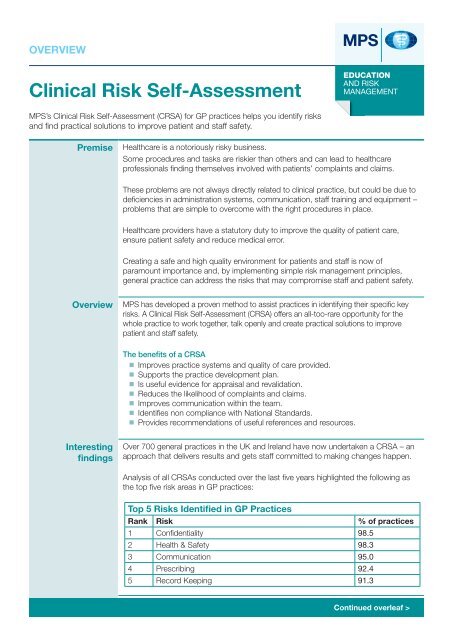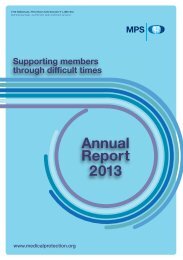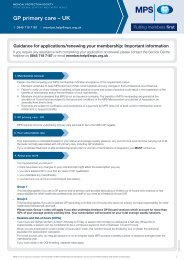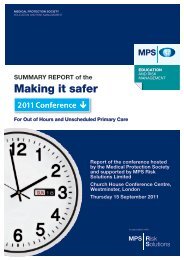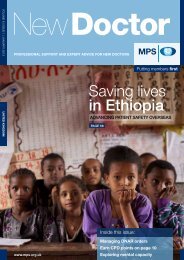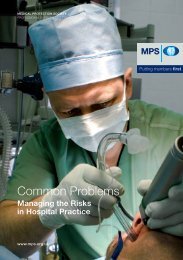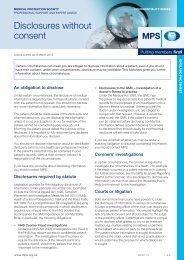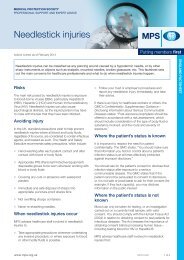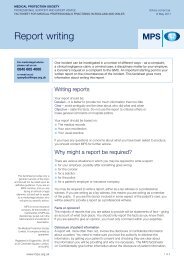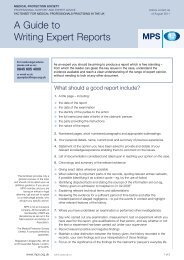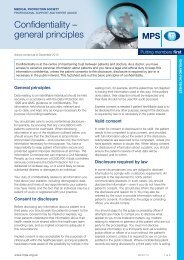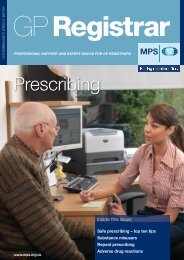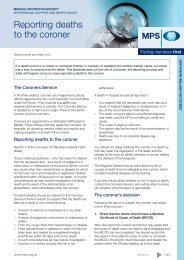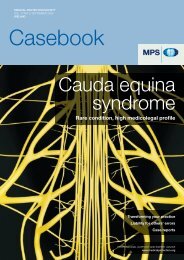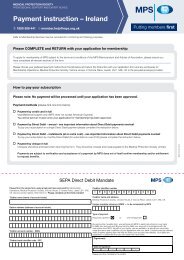Clinical Risk Self-Assessment - Medical Protection Society
Clinical Risk Self-Assessment - Medical Protection Society
Clinical Risk Self-Assessment - Medical Protection Society
Create successful ePaper yourself
Turn your PDF publications into a flip-book with our unique Google optimized e-Paper software.
OVERVIEW<br />
<strong>Clinical</strong> <strong>Risk</strong> <strong>Self</strong>-<strong>Assessment</strong><br />
MPS’s <strong>Clinical</strong> <strong>Risk</strong> <strong>Self</strong>-<strong>Assessment</strong> (CRSA) for GP practices helps you identify risks<br />
and find practical solutions to improve patient and staff safety.<br />
Premise<br />
Healthcare is a notoriously risky business.<br />
Some procedures and tasks are riskier than others and can lead to healthcare<br />
professionals finding themselves involved with patients’ complaints and claims.<br />
These problems are not always directly related to clinical practice, but could be due to<br />
deficiencies in administration systems, communication, staff training and equipment –<br />
problems that are simple to overcome with the right procedures in place.<br />
Healthcare providers have a statutory duty to improve the quality of patient care,<br />
ensure patient safety and reduce medical error.<br />
Creating a safe and high quality environment for patients and staff is now of<br />
paramount importance and, by implementing simple risk management principles,<br />
general practice can address the risks that may compromise staff and patient safety.<br />
Overview<br />
MPS has developed a proven method to assist practices in identifying their specific key<br />
risks. A <strong>Clinical</strong> <strong>Risk</strong> <strong>Self</strong>-<strong>Assessment</strong> (CRSA) offers an all-too-rare opportunity for the<br />
whole practice to work together, talk openly and create practical solutions to improve<br />
patient and staff safety.<br />
The benefits of a CRSA<br />
■■<br />
Improves practice systems and quality of care provided.<br />
■■<br />
Supports the practice development plan.<br />
■■<br />
Is useful evidence for appraisal and revalidation.<br />
■■<br />
Reduces the likelihood of complaints and claims.<br />
■■<br />
Improves communication within the team.<br />
■■<br />
Identifies non compliance with National Standards.<br />
■■<br />
Provides recommendations of useful references and resources.<br />
Interesting<br />
findings<br />
Over 700 general practices in the UK and Ireland have now undertaken a CRSA – an<br />
approach that delivers results and gets staff committed to making changes happen.<br />
Analysis of all CRSAs conducted over the last five years highlighted the following as<br />
the top five risk areas in GP practices:<br />
Top 5 <strong>Risk</strong>s Identified in GP Practices<br />
Rank <strong>Risk</strong> % of practices<br />
1 Confidentiality 98.5<br />
2 Health & Safety 98.3<br />
3 Communication 95.0<br />
4 Prescribing 92.4<br />
5 Record Keeping 91.3<br />
Continued overleaf >
Continued from overleaf<br />
Duration<br />
What’s involved?<br />
One-day visit, which incorporates a half-day workshop (this can be shortened to meet<br />
the needs of the practice if necessary).<br />
Before the visit:<br />
■■<br />
A pre-visit questionnaire, to provide MPS with a snapshot of the practice.<br />
■■<br />
Completion of a staff survey of patient safety, the purpose of which is to help<br />
identify the importance attached to patient safety in the practice.<br />
The visit:<br />
■■<br />
A full-day visit by a trained risk assessment facilitator.<br />
■■<br />
Confidential exploratory discussions with key members of staff from each<br />
discipline, in order to gain an insight into working practices and perceived risks.<br />
■■<br />
A half-day facilitated multi-disciplinary workshop – flexible to meet the needs of<br />
the client.<br />
The workshop includes:<br />
■■<br />
A presentation giving an explanation of risk management and its importance.<br />
■■<br />
Discussion of risks that the practice know have occurred or think could occur.<br />
■■<br />
Discussion of some of these risks in greater depth, leading to corrective actions<br />
which the practice might wish to adopt.<br />
After the visit:<br />
■■<br />
An action plan is produced by the MPS facilitator in the form of a detailed report<br />
containing summaries of the main findings, along with anonymised feedback<br />
regarding the patient safety culture survey. The action plan can be continually<br />
used within team meetings to review progress and keep risk management firmly<br />
on the agenda.<br />
Facilitator<br />
MPS’s risk assessment facilitators are experienced healthcare professionals, with a<br />
passion for education and risk management.<br />
For more information or to book a CRSA, please contact<br />
Neil Hepworth on 0113 241 0624 or visit our website www.mps.org.uk/crsa<br />
MPS0792:03/11


